

10 Things I've Learned About Teaching Online. I celebrated an anniversary recently.
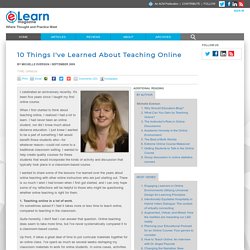
It's been five years since I taught my first online course. When I first started to think about teaching online, I realized I had a lot to learn. I had never been an online student, nor did I know much about distance education. I just knew I wanted to be a part of something I felt would benefit those students who—for whatever reason—could not come to a traditional classroom setting.
I wanted to help create quality courses for these students that would incorporate the kinds of activity and discussion that typically took place in a classroom-based course. I wanted to share some of the lessons I've learned over the years about online teaching with other online instructors who are just starting out. 1. Quite honestly, I don't feel I can answer that question.
Up front, it takes a great deal of time to put curricular materials together for an online class. In the online setting, though, the workload is distributed. A 'Novel' Approach to Education. I was running the Institute for the Learning Sciences at Northwestern University, when the university set up a review of the Institute to be handled by three professors, which was normal procedure every five years or so.
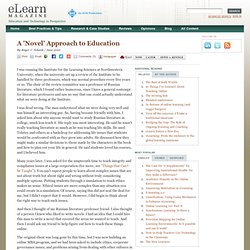
The chair of the review committee was a professor of Russian literature, which I found rather humorous, since I have a general contempt for literature professors and saw no way that one could actually understand what we were doing at the Institute. I was dead wrong. The man understood what we were doing very well and was himself an interesting guy. So, having become friendly with him, I asked him about why anyone would want to study Russian literature in college, much less teach it. His reply was most interesting. Do distance and location matter in e-learning? There are many differences between teaching online and in the classroom-including, as I wrote in a previous column, whether an instructor can see who is making eye contact, nodding in agreement, or sighing with frustration.
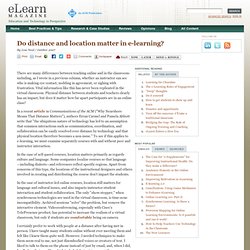
Vital information like this has never been replicated in the virtual classroom. Physical distance between students and teachers clearly has an impact, but does it matter how far apart participants are in an online class? In a recent article in Communications of the ACM ("Why Nearshore Means That Distance Matters"), authors Erran Carmel and Pamela Abbott write that "the ubiquitous nature of technology has led to an assumption that common interactions such as communication, coordination, and collaboration can be easily resolved over distance by technology and that physical location therefore becomes a non-issue. " To see if this applies to e-learning, we must examine separately courses with and without peer and instructor interaction. The reluctant online professor. Most faculty in higher education tend to teach the way they were taught—I know this is true for me.
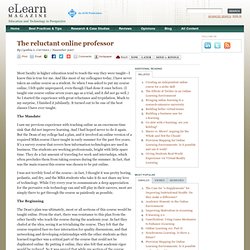
And like most of my colleagues today, I have never taken an online course as a student. So when I was asked to put my course online, I felt quite unprepared, even though I had done it once before. (I taught one course online seven years ago as a trial, and it did not go well.) So I started the experience with great reluctance and trepidation. Much to my surprise, I finished it jubilantly. The Mandate I saw my previous experience with teaching online as an enormous time sink that did not improve learning.
I was not terribly fond of the course—in fact, I thought it was pretty boring, pedantic, and dry, and the MBA students who take it do not share my love of technology. The Beginning The Dean's plan was ultimately, most or all sections of this course would be taught online. The College did make special resources available to me. The Course. An Interview with Dr. Henry Jenkins. Last April eLearn Magazine editor-in-chief Lisa Gualtieri sat down with Dr.
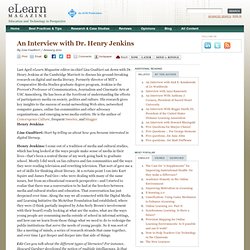
Henry Jenkins at the Cambridge Marriott to discuss his ground-breaking research on digital and media literacy. Formerly director of MIT's Comparative Media Studies graduate degree program, Jenkins is the Provost's Professor of Communication, Journalism and Cinematic Arts at USC Annenberg. He has been at the forefront of understanding the effects of participatory media on society, politics and culture. His research gives key insights to the success of social-networking Web sites, networked computer games, online fan communities and other advocacy organizations, and emerging news media outlets.
He is the author of Convergence Culture, frequent tweeter, and blogger Henry Jenkins Lisa Gualtieri: Start by telling us about how you became interested in digital literacy. LG: Can you talk about the different types of literacies? The Benefits of Experience. The next most important factor is what the tutor or instructional designer does before the learning takes place, and the third key factor is what the manager does after the learning has taken place.
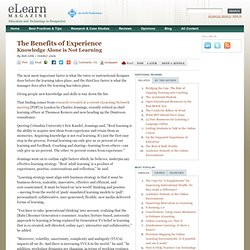
Giving people new knowledge and skills is way down the list. That finding comes from research revealed at a recent eLearning Network meeting [PDF] in London by Charles Jennings, recently retired as chief learning officer at Thomson Reuters and now heading up the Duntroon consultancy. Quoting Columbia University's Eric Kandel, Jennings said, "Real learning is the ability to acquire new ideas from experience and retain them as memories. Acquiring knowledge is not real learning. It's just the first easy step in the process. Jennings went on to outline eight factors which, he believes, underpin any effective learning strategy.